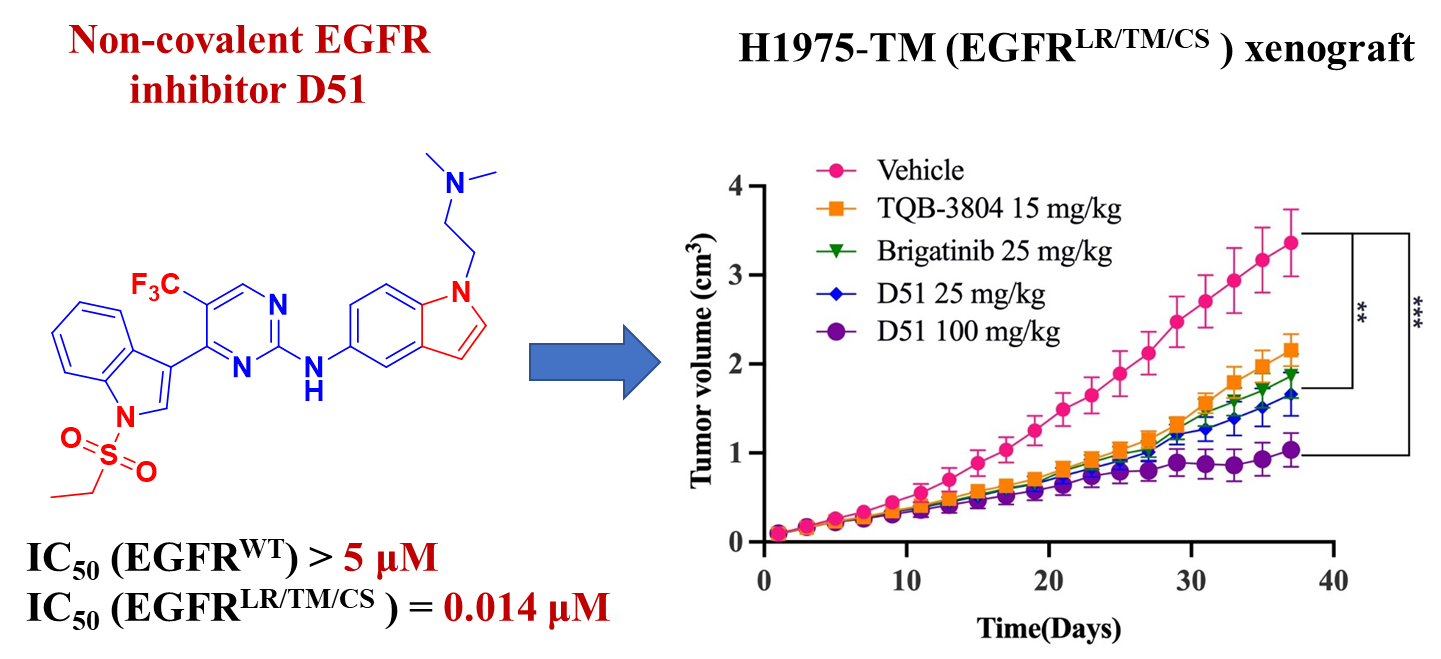Recently, Prof. Yang Peng, Prof. Xiao Yibei and Prof. Sun Haopeng from our school published a paper entitled Discovery of Potent and Wild-Type-Sparing Fourth- Generation EGFR inhibitors for Treatment of Osimertinib-Resistant NSCLC in the top Journal Medicinal Chemistry (IF: 7.3) in the field of medicinal chemistry. Dong Haojie and Ye Xiuquan (two postgraudate students) and Zhu Yasheng (PhD student) of our school are the co-first authors of this paper, and Prof. Yang, Prof. Xiao and Prof. Sun are the co-corresponding authors. CPU is the unique correspondence affiliation.
Lung cancer is one of the cancers with high mortality and morbidity worldwide, of which non-small cell lung cancer (NSCLC) accounts for 80-85%. Epidermal growth factor receptor (EGFR) activating mutations are the major carcinogenic drivers of NSCLC. Successful development of EGFR inhibitors has dramatically improved the survival and quality of life of NSCLC patients. Despite significant success in the treatment of NSCLC with the third-generation inhibitor oxitinib, acquired resistance has become a new challenge. Therefore, to address oxitinib resistance, and developing a fourth generation EGFR potent inhibitor is a pressing and challenging task
The team has found that although patients carrying EGFR triple mutations acquired resistance to ositinib. And ositinib shows some inhibitory activity against EGFR triple mutants in vitro. Therefore, based on the co-crystalline structure of ositinib and target proteins, the team hypothesized to increase the interactions between the compounds and mutants by cyclisation strategy, and a series of compounds have been successfully designed and synthesized. This novel class of compounds showed potent inhibitory effects in in-vitro enzyme activities and cellular anti-proliferative activities. Candidate compound D51 is a non-covalent, potent and highly selective fourth-generation EGFR inhibitor, which can effectively inhibit the EGFRL858R/T790M/C797Smutant while retaining wild-type EGFR activity. Animal studies demonstrated that compound D51 significantly inhibited the development of non-small cell lung cancer tumours carrying EGFRL858R/T790M/C797S and had a good safety profile in vivo. The study provides a promising fourth-generation EGFR inhibitor that offers a potential candidate compound for the treatment of ositinib-resistant NSCLC.
This research was supported by the National Key Research and Development Program of China (2022YFA1303803), the National Natural Science Foundation of China (82073701, 31900687), and the project of the State Key Laboratory of Natural Medicines of CPU (SKLNMZZ202209).
Original link: https://doi.org/10.1021/acs.jmedchem.3c00277



